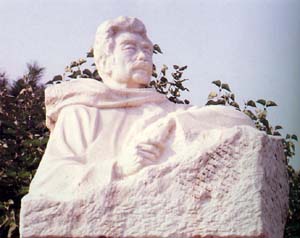Lu Xun Museum

Lu Xun (1881-1936) was regarded as the founder of modern Chinese writing and was a revered scholar and teacher. He was also part of the anti-imperialist May 4 movement of 1919 and his greatest legacy was heading the move towards the creation of simplified Chinese script.
The Lu Xun Museum, found in the northwestern part of the city,
was opened in 1956, to mark the 20th anniversary of the writer’s
death.
The museum is split into 2 sections - part of the
site is Lu Xun’s former home where he lived from 1924-1926, the
other, a large exhibition hall.
In the house you can see the rooms used by Lu Xun
as his study and bedroom and where he wrote such famous novels as
‘The Tomb’ and ‘Wild Grass’ among others.
In the exhibition hall visitors will find the
author’s works on display and more than 10,000 manuscripts, letters,
journals, photographs and other personal objects. There is also
a copy of the entry he made in his diary on the day of his death.
A section of the hall showcases Lu Xun’s library of 16,000 books,
many of the volumes of which were bound by the author himself.
|